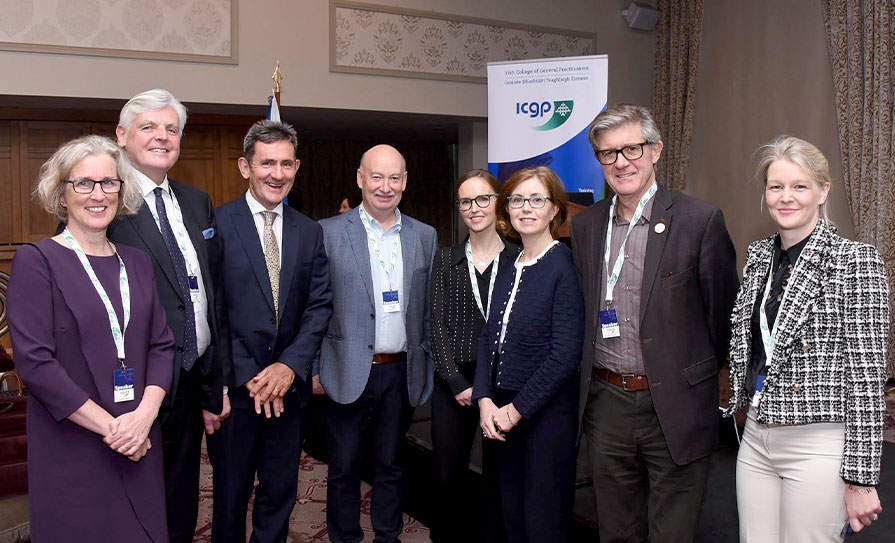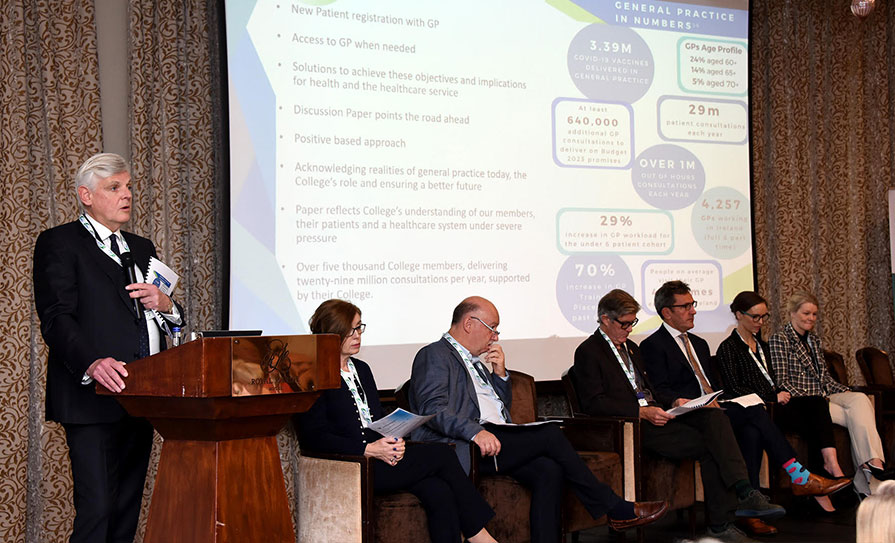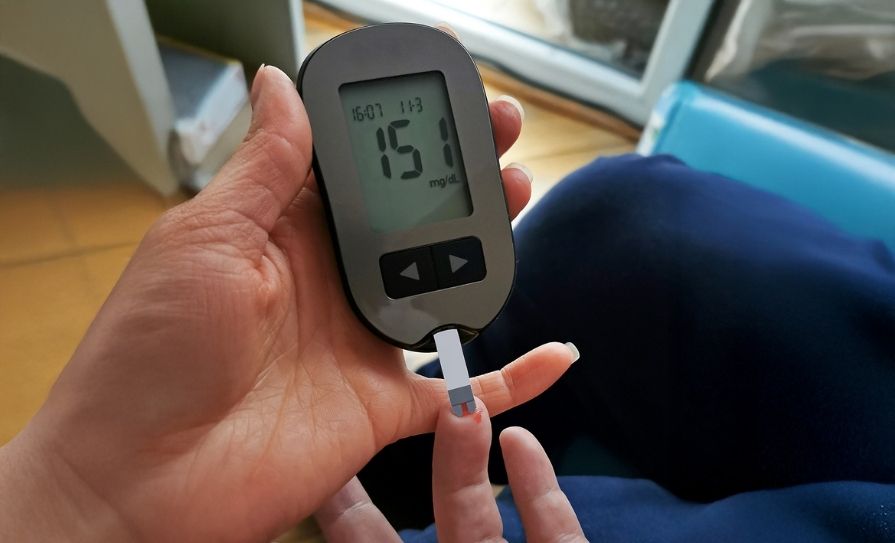Niamh Quinlan reports on the recent ICGP Autumn Conference, which saw the official launch of the College’s new discussion paper on the future of general practice.
The ICGP held its Autumn Conference on 15 October in the Royal Marine Hotel in Dún Laoghaire, Co Dublin, with over 300 College members in attendance. It was the first completely in-person conference held in three years. The Autumn Conference heard from a total of 26 speakers, who discussed a range of issues faced in general practice.
Speaking to the Medical Independent (MI) at the meeting, ICGP President Dr Paul Armstrong said: “When I look back 20 years ago, [at] meetings like this, attendance may not have been as good, speakers were often external speakers that we brought in to talk to us.
“But all the resources [today] have come from within a very vibrant Irish general practice. The College is very proud of that…. This meeting, I think, has vindicated where we are and where we’re trying to go.”
The theme of the conference was ‘Shaping general practice for the future’. This theme tied in with the College’s new discussion paper, Shaping the Future of General Practice, which was officially launched at the meeting.
Shaping the future
The discussion paper outlines 10 possible solutions to the workforce and workload crisis currently facing general practice in Ireland, based on research findings and an ICGP working group.
Among the paper’s main recommendations is that statutory bodies provide resources for future GP careers.
It also calls for the exploration of an increased use of remote consultation, incentives to establish practices in rural areas, an increase in general practice placements to 25 per cent of medical school curricula, the development of the role of the practice manager, and further investment in ‘data-driven’ general practice.
“A number of [the recommendations] are longer term,” Dr Armstrong told MI. “But bringing some of the extra people into practice… is a relatively short-term solution.”
This would include the recommendations in the paper to further the development of multidisciplinary teams (MDTs), a doubling in the number of general practice nurses (GPNs), and the implementation of a programme to “fast-track” qualified GPs to take on a GMS list, according to Dr Armstrong.
He said: “The employment of extra staff within practices could actually be brought to fruition relatively quickly. We’re talking here about people who are already trained as nurses, or as phlebotomists… there are courses that can be done over a relatively short period, that would bring people up to speed.”
Immediate past-President of the ICGP Prof Tom O’Dowd also spoke to MI at the conference. Prof O’Dowd was Chair of the working group that gathered data for the discussion paper.
He said young GPs are “very keen” about the concept of working within MDTs.
According to Shaping the Future, such teams should include GPNs, pharmacists, phlebotomists, and healthcare assistants, for example. The paper also said the ICGP and the Irish General Practice Nurses Educational Association have already commenced engagement with universities “to deliver high-quality education to train GPNs”.
Prof O’Dowd added that this ties into developing and providing suitable premises for general practice, “where colleagues can bump into each other, and who can develop expertise together.”
“We can all learn from each other.”
He added: “If you’re getting a building, you have to do… future-proofing. And that means having a couple of f loors free with nobody on it. Because you will fill them within two or three years because there’s so much work being decanted into general practice.”
He also said that finances are an obstacle to GPs setting up practices.
“The State will have to help in the provision… of premises for young doctors to set up in practices,” he added.
CEO of the ICGP, Mr Fintan Foy told MI that the document has been submitted to Minister for Health Stephen Donnelly.
The Department of Health is currently in the process of establishing a strategic review of general practice. “We will hope our document will form part of that strategic review,” Mr Foy said.
Recently, tensions emerged between stakeholder bodies, such as the ICGP and the IMO, and the Department, after plans for an additional 430,000 GP visit cards were announced in Budget 2023. The ICGP stated that this could lead to an additional annual 640,000 GP visits, which would be unsustainable given general practice is currently experiencing a capacity crisis.
Mr Foy said it is important that the College ensures GPs are heard by politicians, “in the interest of patient care.”
However, he added: “I think you have to work with rather than against….I think you won’t get anywhere by working against each other. We will only achieve what we need to achieve by working with people.”
Steps to take in a GP career
Doctor should “first and foremost” look at what is most important to them when deciding what type of GP they want to be in their career, according to Professor of General Practice at University College Cork, Prof Emma Wallace.
Prof Wallace spoke about the ‘next steps in your GP career’ at the conference. Her talk focused on the different career paths a GP could take and the extracurricular pursuits outside of practice.
Some important issues to consider when planning a career are autonomy, flexibility, financial requirements, and maximising one’s strengths.
“And then thinking about the big picture,” she said. “Taking some time to think about the big picture [and] what your career might look like in five years, in 10 years, and at retirement.”
As GP careers progress, the special interests of a GP may be able to be incorporated into their practice, such as in women’s health, mental health, pre-hospital emergency care, and becoming a GP trainer.
Branching out into academia is also an option to look into during a GP career. There is also the possibility of becoming a ‘portfolio GP’, an “umbrella term” to describe a GP who has multiple roles within their working week. While the career pathway in being a portfolio GP can be less structured, “the variety can be really interesting,” according to Prof Wallace.
She added: “The research shows that having different roles and using different skill sets can help reduce stress and burnout…. The idea being that a change is as good as a rest.”
She said: “[What is] really critical, I think, is to find role models, people whose careers you’d like to emulate and make contact with them. The vast majority of people are absolutely delighted to talk to you about their career successes and things they wish they’d done differently.”
Prof Wallace also reminded delegates that the path to success is not linear.
“Some people certainly are like swans, where they’re very serene, but they’re paddling furiously beneath the water. I think it’s important to remember that and just not to put too much pressure on yourself.”
Prof Wallace also highlighted that “it certainly isn’t all going to go according to plan”, stating there will be delays in long-term plans, particularly with regard to research.
‘How ICGP research benefits you’ was also discussed at the meeting by ICGP Director of Research and Innovation, Prof Claire Collins, and the HSE and ICGP Clinical Lead for the Research Hub in General Practice, Dr Mike O’Callaghan. Both speakers highlighted the importance of Irish-based general practice research for doctors, but also patients.
Education
The current facilitation of education in general practice, in both undergraduate and postgraduate training, was also highlighted at the Autumn Meeting.
Prof O’Dowd announced at the discussion paper’s launch that the ICGP is recommending that 25 per cent of the medical curriculum consist of GP placements.
“I think the medical schools – and I know this from bitter experience – have given general practice a corner of the curriculum,” he told this newspaper.
“And it’s not enough.”
He also told delegates at the conference: “If general practice is on the curriculum, students get exposure to it, then they’re much more likely to make an informed career decision that will be suitable for general practice.”
Chair of the Board of the ICGP Dr John Farrell also told delegates that “there is a challenge here for really everybody in the room” with regard to education and training.
“What happens is that people are quite happy to have postgraduates… from the training programmes, but not necessarily [to take on students] at an undergrad level. But if we want to affect serious change… that’s what we need to do.”
Prof Susan Smith, Professor of General Practice in Trinity College Dublin, also spoke to MI about this proposal. While she is a member of the ICGP, she did not take part in constructing the Shaping the Future discussion paper.
However, Prof Smith said she expects the proposal of increased GP placements to be welcomed by the medical schools.
“It will require reorganisation of the curricula,” she said.
“But the hospital placements are just under so much pressure now that the medical schools would also like to do more of their clinical training out in the community as well.”
She added that the proposal is feasible, and as stated in the discussion document, the University of Limerick already allocates 25 per cent of its placements to general practice.
“But it requires central Government policy and planning,” Prof Smith said. “The funding to do it in general practice has to come from central government; it can’t come through the medical schools from their own budgets.”
Prof Smith also presented a talk at the conference on ‘What does it take to #BeAGP?’. In the talk she highlighted the multimorbidity and “explosion of polypharmacy in Ireland” prevalent in general practice.

College strategy
The College’s new three-year strategy was also launched at the meeting during a closed session. It is entitled, Navigating the Future for General Practice: Statement of Strategy 2023–2026.
Dr Farrell told MI that the strategy is “putting general practice at the heart of patient care in the community, underpinned by education from the College… to show the way forward”.
“What we want to show is that membership should be at the heart of everything we do,” he said.
Dr Farrell told delegates that the College wants a “participant membership”.
“We have to reinvigorate our faculties, our CME [continuing medical education] groups, and make sure that we meet [in person]…. Our members’ engagement is central to the College ensuring a strong profession and [that general practice is] the specialty of choice by doctors making their career choices.”
Dr Farrell added, with this member-central approach, it is important that “the ICGP is not viewed as a Dublin-centric organisation in an ivory tower. It is far from that.”
Implementation of the three-year strategy is “reliant” on “valued” College employees to enable delivery of the document’s vision, according to Dr Farrell, who launched the strategy along with Mr Foy.
The College currently employs over 180 staff.
“We have to look at people, we have to develop people, and we have to maintain a sustainable staff,” Mr Foy said.
It is important that all staff adhere to new learning and development models, he added.
“We need to be looking at succession planning, we need to be looking ahead five [and] 10 years, whether that be at a management level, operational level, [and] governance level as well.”
The strategy’s aims include the promotion of general practice and the role of the GP, as well as pragmatic solutions to the workforce crisis in general practice, which will enable members to maintain a healthy work-life balance in “a rewarding and valued career”. The document will be made available on the ICGP website, www.ICGP.ie.
Contraception in general practice
A number of safety considerations when prescribing contraceptive methods in general practice were covered at the ICGP Autumn Conference.
In September, the Department of Health launched free access to prescription contraception and long-acting reversible contraception from a woman’s GP. In Budget 2023, it will be extended to 15-to-30 year-olds.
HSE and ICGP Clinical Lead for Women’s Health Dr Ciara McCarthy spoke about the considerations of different types of contraception for patients with obesity and related comorbidities.
The combined hormonal contraceptive is “the one we probably think of most when we think of overweight and obesity”, Dr McCarthy told delegates at the ICGP meeting.
She said: “The important point to consider here is the efficacy of methods in patients who have increased weight or increased BMI.” While there is no evidence for reduced efficacy with the combined oral contraception or vaginal ring, there are some studies which show increased ovarian activity during the pill-free interval in patients with obesity.
The summary of product characteristics for the combined oral contraceptive transdermal patch also shows reduced efficacy in patients over 90kg.
“The good news is that efficacy of injectable contraceptives is not affected by weight or BMI, and nor do you have to give the contraceptive injection at a shorter interval than normal,” said Dr McCarthy. However, for patients with a higher body weight an alternative injection site or a longer needle may need to be considered, she added.
Regarding emergency contraception, Dr McCarthy said the copper coil “remains the most effective form of emergency contraception and its efficacy is not affected by weight or BMI”. However, with the levonorgestrel emergency pill, there is a “four-fold” increased risk of failure for patients with a BMI of over 26 or [weight] over 70kg, “which is quite low,” she added.
Dr McCarthy also spoke about counselling older patients who may not feel they need contraception. “It is important to tell them that they do require effective contraception up until the age of menopause or until the age of 55, whichever comes first,” she said.
Speaking to Medical Independent, ICGP Assistant Medical Director and Director of Women’s Health Dr Nóirín O’Herlihy said: “Sometimes it’s actually the women who are over 40 who require it most and they’re often forgotten.”
Dr O’Herlihy also presented at the Autumn Meeting on post-partum contraception.
She said: “We will be offering her [the mother] contraception and not putting pressure on her. Often we find that women are not in a place at the six-week check where they want to start on contraception and they prefer to return. But if they do want contraception, then we have to counsel her [on] the options.”
Dr O’Herlihy also spoke about contraception after abortion, “as this is something now that we are dealing with more in general practice.”
“Women should be advised that any method of contraception can be safely initiated immediately after an uncomplicated abortion,” she said.













Leave a Reply
You must be logged in to post a comment.